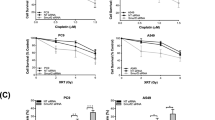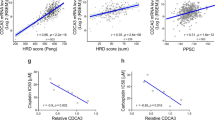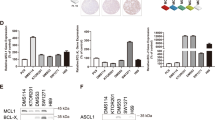Abstract
Non-small-cell lung cancer (NSCLC) is the most deadly type of cancer in the United States and worldwide. Although new therapy is available, the survival rate of NSCLC patients remains low. One hallmark of cancer cells is defects in the apoptotic cell death program. In this study, we investigate the role of B-cell lymphoma 2 (Bcl-2) family members Bcl-2, Bcl-xL and Mcl-1, known to regulate cell survival and death, in a panel of fourteen NSCLC cell lines. NSCLC cell lines express high levels of Mcl-1 and Bcl-xL, but not Bcl-2. Silencing the expression of Mcl-1 with small interfering RNA (siRNA) oligonucleotides potently killed a subgroup of NSCLC cell lines. In contrast, Bcl-xL siRNA had no effect in these lines unless Mcl-1 siRNA was also introduced. Interestingly, high MCL1 to BCL-xl messenger RNA determines whether the cells depend on Mcl-1 for survival. We further investigated the role of Mcl-1 in NSCLC cells using a Mcl-1-dependent cell line, H23. The expression of a complementary DNA containing only the coding region of MCL1 rescued H23 cells from the toxicity of a 3′ untranslated region (UTR) targeting Mcl-1 siRNA but not a siRNA targeting the coding region of MCL1. Furthermore, we show that Mcl-1 sequesters the BH3-only protein Noxa and Bim and the apoptotic effector Bak. Not surprisingly, Noxa, Bim, or Bak knockdown partially rescued H23 cells from toxicity mediated by Mcl-1 siRNA to different degrees. Collectively, our results indicate that targeting Mcl-1 may improve therapy for a subset of NSCLC patients.
This is a preview of subscription content, access via your institution
Access options
Subscribe to this journal
Receive 50 print issues and online access
$259.00 per year
only $5.18 per issue
Buy this article
- Purchase on Springer Link
- Instant access to full article PDF
Prices may be subject to local taxes which are calculated during checkout




Similar content being viewed by others
References
Akgul C . (2009). Mcl-1 is a potential therapeutic target in multiple types of cancer. Cell Mol Life Sci 66: 1326–1336.
Berrieman HK, Smith L, O'Kane SL, Campbell A, Lind MJ, Cawkwell L . (2005). The expression of Bcl-2 family proteins differs between nonsmall cell lung carcinoma subtypes. Cancer 103: 1415–1419.
Borner MM, Brousset P, Pfanner-Meyer B, Bacchi M, Vonlanthen S, Hotz MA et al. (1999). Expression of apoptosis regulatory proteins of the Bcl-2 family and p53 in primary resected non-small-cell lung cancer. Br J Cancer 79: 952–958.
Chen L, Willis SN, Wei A, Smith BJ, Fletcher JI, Hinds MG et al. (2005). Differential targeting of prosurvival Bcl-2 proteins by their BH3-only ligands allows complementary apoptotic function. Mol Cell 17: 393–403.
Chen S, Dai Y, Harada H, Dent P, Grant S . (2007). Mcl-1 down-regulation potentiates ABT-737 lethality by cooperatively inducing Bak activation and Bax translocation. Cancer Res 67: 782–791.
Cory S, Huang DC, Adams JM . (2003). The Bcl-2 family: roles in cell survival and oncogenesis. Oncogene 22: 8590–8607.
Hanahan D, Weinberg RA . (2000). The hallmarks of cancer. Cell 100: 57–70.
Keuling AM, Felton KE, Parker AA, Akbari M, Andrew SE, Tron VA . (2009). RNA silencing of Mcl-1 enhances ABT-737-mediated apoptosis in melanoma: role for a caspase-8-dependent pathway. PLoS One 4: e6651.
Letai A, Bassik MC, Walensky LD, Sorcinelli MD, Weiler S, Korsmeyer SJ . (2002). Distinct BH3 domains either sensitize or activate mitochondrial apoptosis, serving as prototype cancer therapeutics. Cancer Cell 2: 183–192.
Leu JI, Dumont P, Hafey M, Murphy ME, George DL . (2004). Mitochondrial p53 activates Bak and causes disruption of a Bak-Mcl1 complex. Nat Cell Biol 6: 443–450.
Li J, Viallet J, Haura EB . (2008). A small molecule pan-Bcl-2 family inhibitor, GX15-070, induces apoptosis and enhances cisplatin-induced apoptosis in non-small cell lung cancer cells. Cancer Chemother Pharmacol 61: 525–534.
Lin X, Morgan-Lappe S, Huang X, Li L, Zakula DM, Vernetti LA et al. (2007). ‘Seed’ analysis of off-target siRNAs reveals an essential role of Mcl-1 in resistance to the small-molecule Bcl-2/Bcl-XL inhibitor ABT-737. Oncogene 26: 3972–3979.
Linardou H, Dahabreh IJ, Bafaloukos D, Kosmidis P, Murray S . (2009). Somatic EGFR mutations and efficacy of tyrosine kinase inhibitors in NSCLC. Nat Rev Clin Oncol 6: 352–366.
Minna JD, Roth JA, Gazdar AF . (2002). Focus on lung cancer. Cancer Cell 1: 49–52.
Reed JC, Doctor KS, Godzik A . (2004). The domains of apoptosis: a genomics perspective. Sci STKE 2004: re9.
Rodenhuis S, Slebos RJ . (1992). Clinical significance of ras oncogene activation in human lung cancer. Cancer Res 52: 2665s–22669s.
Song L, Coppola D, Livingston S, Cress D, Haura EB . (2005). Mcl-1 regulates survival and sensitivity to diverse apoptotic stimuli in human non-small cell lung cancer cells. Cancer Biol Ther 4: 267–276.
Sun S, Schiller JH, Spinola M, Minna JD . (2007). New molecularly targeted therapies for lung cancer. J Clin Invest 117: 2740–2750.
Tagscherer KE, Fassl A, Campos B, Farhadi M, Kraemer A, Bock BC et al. (2008). Apoptosis-based treatment of glioblastomas with ABT-737, a novel small molecule inhibitor of Bcl-2 family proteins. Oncogene 27: 6646–6656.
Tahir SK, Yang X, Anderson MG, Morgan-Lappe SE, Sarthy AV, Chen J et al. (2007). Influence of Bcl-2 family members on the cellular response of small-cell lung cancer cell lines to ABT-737. Cancer Res 67: 1176–1183.
Tse C, Shoemaker AR, Adickes J, Anderson MG, Chen J, Jin S et al. (2008). ABT-263: a potent and orally bioavailable Bcl-2 family inhibitor. Cancer Res 68: 3421–3428.
Wesarg E, Hoffarth S, Wiewrodt R, Kroll M, Biesterfeld S, Huber C et al. (2007). Targeting BCL-2 family proteins to overcome drug resistance in non-small cell lung cancer. Int J Cancer 121: 2387–2394.
Willis SN, Chen L, Dewson G, Wei A, Naik E, Fletcher JI et al. (2005). Proapoptotic Bak is sequestered by Mcl-1 and Bcl-xL, but not Bcl-2, until displaced by BH3-only proteins. Genes Dev 19: 1294–1305.
Willis SN, Fletcher JI, Kaufmann T, van Delft MF, Chen L, Czabotar PE et al. (2007). Apoptosis initiated when BH3 ligands engage multiple Bcl-2 homologs, not Bax or Bak. Science 315: 856–859.
Zhai D, Jin C, Huang Z, Satterthwait AC, Reed JC . (2008). Differential regulation of Bax and Bak by anti-apoptotic Bcl-2 family proteins Bcl-B and Mcl-1. J Biol Chem 283: 9580–9586.
Zhang B, Gojo I, Fenton RG . (2002). Myeloid cell factor-1 is a critical survival factor for multiple myeloma. Blood 99: 1885–1893.
Acknowledgements
We thank members of the Leverson laboratory for helpful discussions.
Author information
Authors and Affiliations
Corresponding author
Ethics declarations
Competing interests
The authors declare no conflict of interest.
Rights and permissions
About this article
Cite this article
Zhang, H., Guttikonda, S., Roberts, L. et al. Mcl-1 is critical for survival in a subgroup of non-small-cell lung cancer cell lines. Oncogene 30, 1963–1968 (2011). https://doi.org/10.1038/onc.2010.559
Received:
Revised:
Accepted:
Published:
Issue Date:
DOI: https://doi.org/10.1038/onc.2010.559
Keywords
This article is cited by
-
PRKCSH contributes to TNFSF resistance by extending IGF1R half-life and activation in lung cancer
Experimental & Molecular Medicine (2024)
-
Skp2 stabilizes Mcl-1 and confers radioresistance in colorectal cancer
Cell Death & Disease (2022)
-
BH3-mimetics: recent developments in cancer therapy
Journal of Experimental & Clinical Cancer Research (2021)
-
Dysfunction of chaperone-mediated autophagy in human diseases
Molecular and Cellular Biochemistry (2021)
-
4Ei-10 interdiction of oncogenic cap-mediated translation as therapy for non-small cell lung cancer
Investigational New Drugs (2021)



